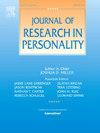People “fake-good” on personality self-reports more strongly in a job context than in a dating context
IF 2.6
2区 心理学
Q2 PSYCHOLOGY, SOCIAL
引用次数: 0
Abstract
Socially desirable responding can impair the validity of self-report questionnaires, especially in high-stakes situations in which people are incentivized to manage the impression they make on others. The current experiment examined the context dependency of impression management. Participants (N = 231) completed the Big Five Inventory-2 twice, first honestly and then with faking-good instructions in a job or dating context. Socially desirable responding was present in both contexts but was more pronounced in the job context than in the dating context for many (but not all) Big Five domains and facets. Future research should investigate whether faking behavior differs across contexts not only under faking-good instructions but also in high-stakes situations (e.g., personnel selection or online dating).
人们在工作环境中比在约会环境中更倾向于“假好”
社会期望的回答会削弱自我报告问卷的有效性,特别是在高风险的情况下,人们被激励去管理他们给别人的印象。本实验考察了印象管理的语境依赖性。参与者(N = 231)完成了两次“五大清单-2”,第一次是诚实的,然后是在工作或约会环境中假装良好的指示。社会期望的回应在这两种情况下都存在,但在工作环境中比在约会环境中更明显(但不是全部)五大领域和方面。未来的研究应该调查假装行为是否在不同的情境下有所不同,不仅是在假装好的指示下,而且在高风险的情况下(例如,人事选择或在线约会)。
本文章由计算机程序翻译,如有差异,请以英文原文为准。
求助全文
约1分钟内获得全文
求助全文
来源期刊

Journal of Research in Personality
PSYCHOLOGY, SOCIAL-
CiteScore
5.40
自引率
6.10%
发文量
102
审稿时长
67 days
期刊介绍:
Emphasizing experimental and descriptive research, the Journal of Research in Personality presents articles that examine important issues in the field of personality and in related fields basic to the understanding of personality. The subject matter includes treatments of genetic, physiological, motivational, learning, perceptual, cognitive, and social processes of both normal and abnormal kinds in human and animal subjects. Features: • Papers that present integrated sets of studies that address significant theoretical issues relating to personality. • Theoretical papers and critical reviews of current experimental and methodological interest. • Single, well-designed studies of an innovative nature. • Brief reports, including replication or null result studies of previously reported findings, or a well-designed studies addressing questions of limited scope.
 求助内容:
求助内容: 应助结果提醒方式:
应助结果提醒方式:


